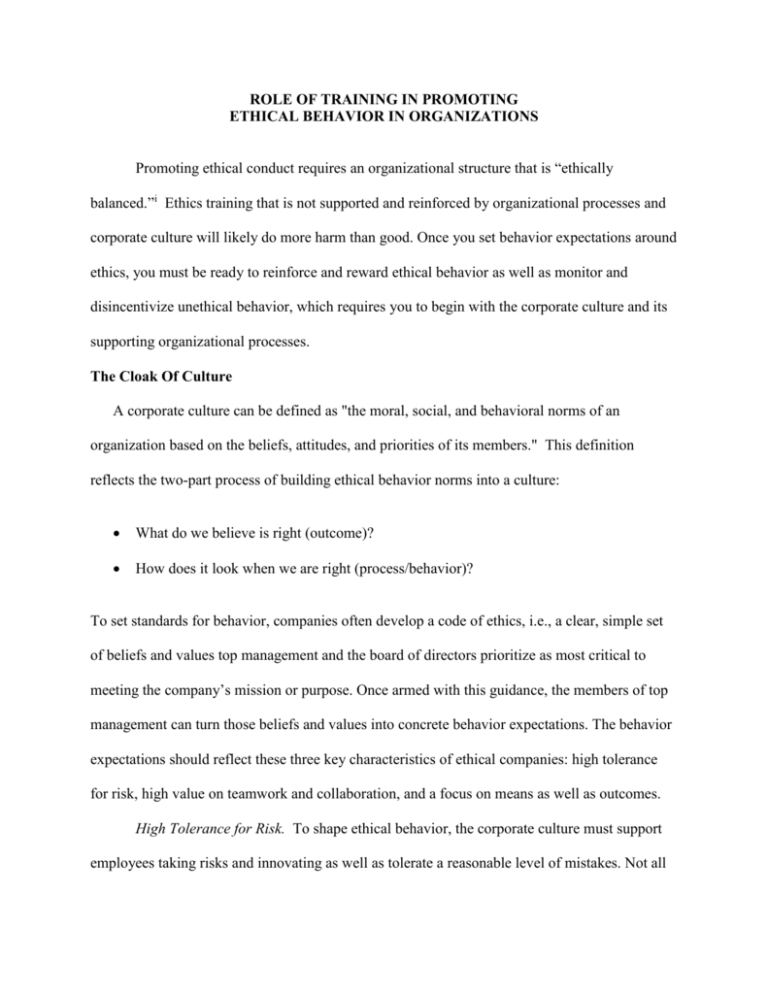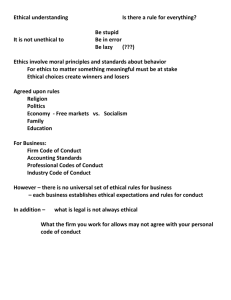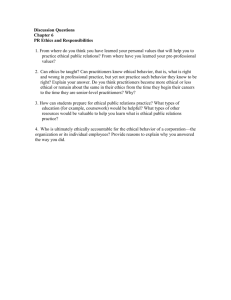
ROLE OF TRAINING IN PROMOTING
ETHICAL BEHAVIOR IN ORGANIZATIONS
Promoting ethical conduct requires an organizational structure that is “ethically
balanced.”i Ethics training that is not supported and reinforced by organizational processes and
corporate culture will likely do more harm than good. Once you set behavior expectations around
ethics, you must be ready to reinforce and reward ethical behavior as well as monitor and
disincentivize unethical behavior, which requires you to begin with the corporate culture and its
supporting organizational processes.
The Cloak Of Culture
A corporate culture can be defined as "the moral, social, and behavioral norms of an
organization based on the beliefs, attitudes, and priorities of its members." This definition
reflects the two-part process of building ethical behavior norms into a culture:
What do we believe is right (outcome)?
How does it look when we are right (process/behavior)?
To set standards for behavior, companies often develop a code of ethics, i.e., a clear, simple set
of beliefs and values top management and the board of directors prioritize as most critical to
meeting the company’s mission or purpose. Once armed with this guidance, the members of top
management can turn those beliefs and values into concrete behavior expectations. The behavior
expectations should reflect these three key characteristics of ethical companies: high tolerance
for risk, high value on teamwork and collaboration, and a focus on means as well as outcomes.
High Tolerance for Risk. To shape ethical behavior, the corporate culture must support
employees taking risks and innovating as well as tolerate a reasonable level of mistakes. Not all
Promoting Ethical Behavior Page 2
risks pay off and not all innovations work, but you want employees to learn from what doesn’t
work and keep trying to find what does, and feel supported and safe doing so. Employees who
feel comfortable taking risks and are not afraid to stand out from the crowd and express a
different opinion will be more likely to speak out against and report ethical misbehavior and take
initiative in acting ethically.
High Value on Teamwork and Collaboration. In ethical cultures, employees are
discouraged from engaging in unbridled competition and rewarded for their collaboration and
teamwork skills. Making it clear that the organization expects employees to think of the impact
of their behavior on peers and customers limits the incentives for maintaining a competitive,
win-lose focus, or acting on individual best interest at the expense of others’ vulnerabilities A
focus on teamwork and collaboration as corporate values emphasizes the importance of creating
win-win outcomes.
Focus on Means as Well as Outcomes. Probably the most important characteristic of an
ethical corporate culture is a focus on how goals are achieved as well as what goals are achieved.
As we watched Lay and Skilling, the leaders of Enron, on the witness stand, we heard them say
over and over again that they had the best interest of the shareholder’s in mind at all times, that
everything they did was in pursuit of an honorable goal. What ethical companies have in
common is an understanding that the ends do not automatically justify the means, that the values
espoused by the company apply every step of the way, not just at the finish line. Employees pay
close attention to what managers care about. When company leaders reward top salespeople with
no regard to how those sales were achieved or focus on the bottom line exclusively with no
regard to how that target is reached, they are incentivizing unethical behavior. Conversely, when
company leaders punish top salespeople who have used tactics inconsistent with company
Promoting Ethical Behavior Page 3
values, and set expectations of behavior that overshadow profit targets, they are incentivizing
ethical behavior.
Organizational Processes
Because all but a few employees with strong internal codes of ethics will act unethically
if there are organizational incentives and pressures to do so, organizational processes are critical
to promoting ethical behavior. To provide the required structure and support to an ethical culture,
organizational processes and procedures must be evaluated to add incentives for ethical behavior
and add disincentives for unethical behavior. The first processes to examine are typically under
the auspices of HR:
Personnel recruitment and selection processes
Performance-evaluation systems
Compensation systems
Reporting, evaluating, and monitoring mechanisms
Decision-making practices and protocols
Training
Personnel recruitment and selection processes. As discussed earlier, selection is one of
the tools for initiating and maintaining culture. The process used for recruitment must identify
ways to attract employees who will be a good fit with the company’s ethically focused culture
and provide the required diversity of skills and perspectives. HR must also develop guidelines
for evaluating the values and character of potential hires as well as their experience in
demonstrating ethical behaviors in addition to the traditional screening for technical and
interpersonal skills.
(end of excerpt)
Promoting Ethical Behavior Page 4
i
Harvey, J. (2000). Reinforcing ethical decision making through organizational structure.
Journal of Business Ethics, 28(1), p. 43.
2. Robbins, S. (2005). Organizational Behavior (11th ed.). Upper Saddle River, NJ: Pearson
Prentice Hall.









